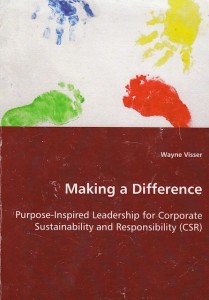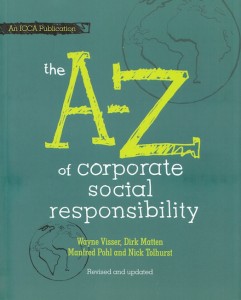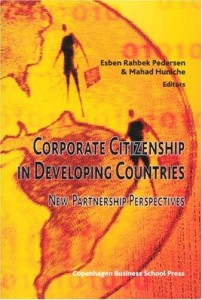CSR Change Agency:
Making a Difference
Paper by Wayne Visser
In the face of unprecedented global challenges like financial market instability, persistent poverty and climate change, can individuals make a difference? This article looks at what motivates people to devote their time and energies to addressing social, environmental and ethical issues.
In particular, it shows how corporate sustainability and responsibility (CSR) can provide a powerful way to address what I called in a previous article for Ethical Corporation (‘Five corporate sustainability challenges that remain unmet’, EC 31, July 2004), the ‘existential gap’, i.e. the lack of a deeper sense of personal meaning and job satisfaction felt by many employees today.
A survey a few years ago by the London PR agency, Fish Can Sing, already hinted at the extent of the problem. They found that 66 per cent all 18-35 year-olds are unhappy at work, and the proportion rises to 83 per cent among 30-35 year-olds. According to their results, one in 15 has already quit the rat race and 45 per cent are seriously contemplating a career change.
They labelled this group of people ‘TIREDs’ – or Thirty-something Independent Radical Educated Drop-outs. In analysing this market segment, they discovered that these otherwise highly successful and motivated professionals were lacking something in their corporate life. This they called the ‘LDDR factor’ – they wanted Less Demand (i.e. less work-related stress, shorter working hours) and Deeper Reward (i.e. more job satisfaction, higher quality of life).
What‟s more, this existential crisis doesn’t appear to be confined either to the thirty-something age group, nor to the UK. According to the Worldwatch Institute, about a third of Americans report being ‘very happy, the same share as in 1957, when Americans were only half as wealthy. And in Japan, there is a word for ‘death from overwork’ (karoshi).
In fact, the industrialised world in general fares much worse than expected on some measures of wellbeing. For example, in the New Economics Foundation’s 2006 Happy Planet Index, which measures the relative efficiency with which nations convert the planet’s natural resources into long and happy lives for their citizens, Italy is 66th, Germany 81st, Japan 95th, the UK comes 108th, Canada 111th, France 129th, United States 150th and Russia 172nd.
So what is going on here? Victor Frankl, author of Man’s Search for Meaning and a personal survivor of four Nazi concentration camps, suggests that our Western pursuit of economic growth may be to blame: ‘Consider today’s society,’ he says. ‘It gratifies and satisfies virtually every need – except for one, the need for meaning. This spreading meaning vacuum is especially evident in affluent industrial countries. People have the means for living, but not the meanings.’
Management guru, Charles Handy, puts it another way: ‘We seem to be saying that life is about economics, that money is the measure of things. My hunch is that most of us don’t believe any of this, and that it won’t work, but we are trapped in our own rhetoric and have, as yet, nothing else to offer, not even a different way to talk about it’ …
Continue reading
[button size=”small” color=”blue” style=”download” new_window=”false” link=”http://www.waynevisser.com/wp-content/uploads/2012/05/paper_csr_change_agency_wvisser.pdf”]Pdf[/button] CSR Change Agency (paper)
Related pages
[button size=”small” color=”blue” style=”info” new_window=”false” link=”http://www.waynevisser.com/books/making-a-difference”]Page[/button] Making a Difference (book)
[button size=”small” color=”blue” style=”tick” new_window=”false” link=”http://www.csrinternational.org”]Link[/button] CSR International (website)
Cite this article
Visser, W. (2008) CSR Change Agency: Making a Difference, CSR International Paper Series, No. 1.











